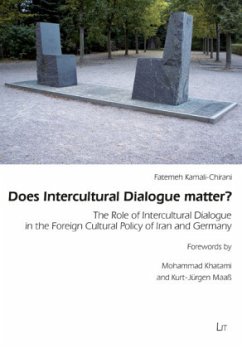"Intercultural dialogue" between Western and Muslim countries is often presented as a way to reduce conflict. In this view, dialogue will lead to a better understanding, which in turn will contribute to a more peaceful coexistence. On the other hand, "intercultural dialogue" for more than two decades also has been part of Foreign Cultural Policy, an instrument of the foreign policy of governments.
This book describes and analyzes how and why "intercultural dialogue" has been a part of German-Iranian relations. It was pursued by heads of states, government ministries, parastatal organizations, NGOs, and committed individuals from both countries. Fatemeh Kamali-Chirani discusses whether this approach was merely symbolic or decorative, or whether is actually mattered, politically and culturally.
This book describes and analyzes how and why "intercultural dialogue" has been a part of German-Iranian relations. It was pursued by heads of states, government ministries, parastatal organizations, NGOs, and committed individuals from both countries. Fatemeh Kamali-Chirani discusses whether this approach was merely symbolic or decorative, or whether is actually mattered, politically and culturally.

